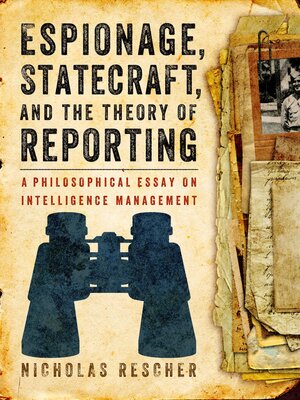Espionage, Statecraft, and the Theory of Reporting
ebook ∣ A Philosophical Essay on Intelligence Management
By Nicholas Rescher

Sign up to save your library
With an OverDrive account, you can save your favorite libraries for at-a-glance information about availability. Find out more about OverDrive accounts.
Find this title in Libby, the library reading app by OverDrive.



Search for a digital library with this title
Title found at these libraries:
| Library Name | Distance |
|---|---|
| Loading... |
Everything we know about what goes on in the world comes to us through reports, information transmitted through human communication. We rely on reports, which can take any number of forms, to convey useful information, and we derive knowledge from that information. It's no surprise, then, that reporting has many philosophical dimensions. Because it plays such a major role in knowledge management, as Nicholas Rescher argues, the epistemology of reporting not only deserves our attention but also sheds important light on how we understand the theory of knowledge. This book offers a clear, accessible introduction to the theory of reporting, with a special emphasis on national security, particularly military and diplomatic reporting, drawing on examples from historical accounts of espionage and statecraft from the Second World War. Rescher explores the various issues and problems related to the production and reception of reports—including reporter expertise and trustworthiness, transmission modalities, confidentiality, cognitive importance, and the interpretation, evaluation, and utilization of reports—providing readers with a distinctive and well organized philosophical clarification of some central features of the theory of reporting.







